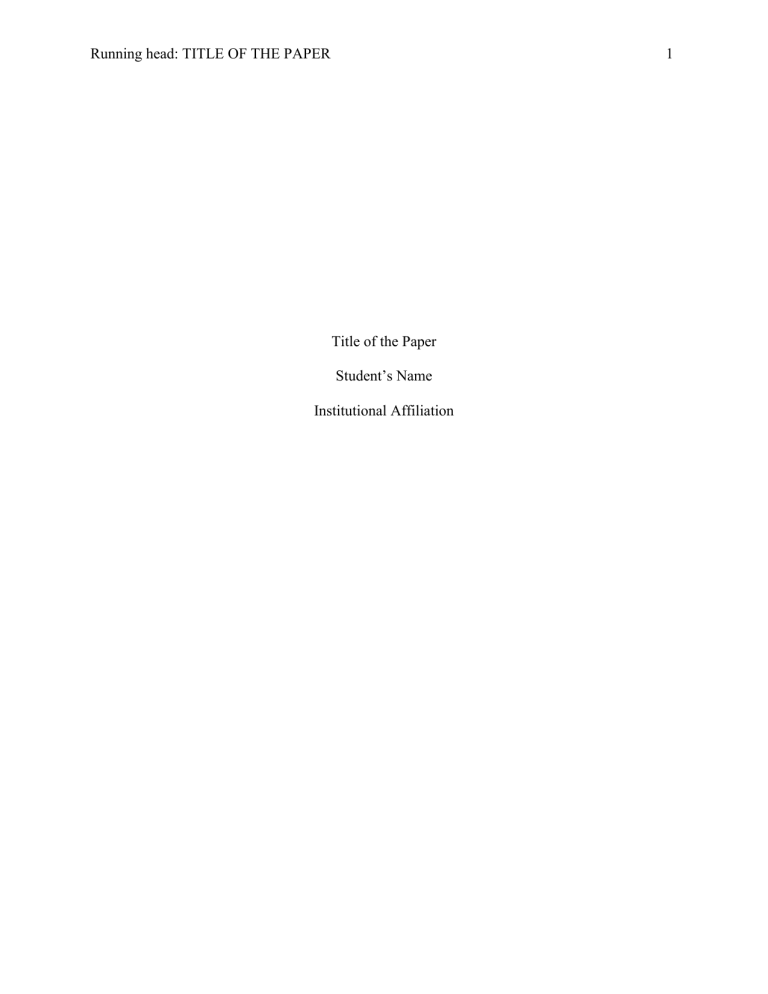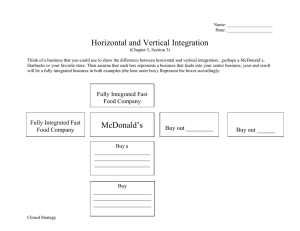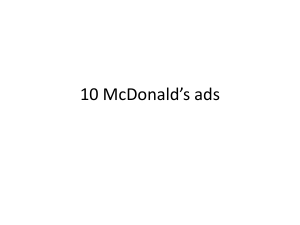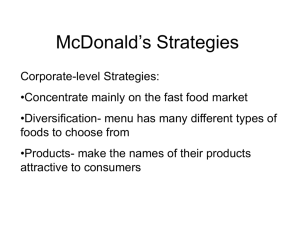
Running head: TITLE OF THE PAPER 1 Title of the Paper Student’s Name Institutional Affiliation TITLE OF THE PAPER 2 Assessing Financial Risks and Sales Growth In the fast-food industry, companies like McDonald's face various financial risks that can impact their sales growth and overall performance. Two primary categories of risk that companies encounter are systematic risk and unsystematic risk. Systematic risk affects the entire system or market and is generally unavoidable, while unsystematic risk is specific to individual companies and can be reduced through diversification strategies and well-informed decisionmaking. The COVID-19 pandemic serves as an illustrative example of systematic risk in the fastfood industry. The global outbreak of the virus resulted in widespread lockdowns and restrictions on movement, leading to the closure of restaurants and reduced consumer spending. As a result, McDonald's and other fast-food chains faced significant revenue declines due to decreased foot traffic and increased reliance on delivery and takeout services. Another instance of systematic risk impacting McDonald's occurred when Russia invaded Ukraine. This geopolitical event had severe consequences for McDonald's operations in both countries. McDonald's chose to permanently close in Russia due to the humanitarian crisis. In Ukraine, the ongoing conflict transformed the region into a war zone, prompting McDonald's to close its restaurants to ensure the safety of its employees and customers. These examples highlight the inherent nature of systematic risk, as such events are unpredictable, affecting the entire industry, and beyond the control of any individual company. McDonald's and other fast-food chains must adopt adaptive strategies to withstand such global disruptions effectively. One example of unsystematic risk for McDonald's is its choice of locations for restaurants. McDonald's can decide not to open outlets in certain countries or areas where the TITLE OF THE PAPER 3 risk is deemed too high due to political instability, regulatory challenges, or unfavorable market conditions. This decision-making process allows the company to mitigate potential losses associated with adverse events specific to those regions. Unsystematic risk can also arise from factors such as changes in consumer preferences, negative publicity, or product-related issues. These factors can lead to a decline in sales and damage the brand's reputation. McDonald's and other fast-food companies must invest in market research and customer feedback to anticipate and address potential issues, thereby reducing unsystematic risk. The fast-food industry, including McDonald's, faces numerous economic risks that can significantly impact their financial performance. One such risk is high inflation. When inflation rates rise, the costs of running restaurants also increase. The prices of ingredients, utilities, and labor typically surge, putting pressure on profit margins. High inflation often leads central banks, such as the Federal Reserve in the United States, to implement monetary policy measures to combat inflation. One such measure is raising interest rates. As mentioned by Bender and Panz (2021), this is categorized as market risk. Rising interest rates can impact McDonald's in several ways. Firstly, higher interest rates increase the cost of borrowing for the company, affecting its financing decisions and potentially limiting expansion plans. Secondly, consumers may face increased borrowing costs, leading to reduced discretionary spending, which could negatively impact sales. The combination of high inflation, rising interest rates, and reduced consumer spending may lead to credit risk. When consumers struggle to manage their debts due to increased living costs and borrowing costs, there is a higher likelihood of loan defaults. This could impact TITLE OF THE PAPER 4 financial institutions and result in a reduction of available credit for businesses, including McDonald's. Lastly, there is operational risks, operational risk in the fast-food industry primarily stems from internal mismanagement, errors, or fraudulent activities. Such risks can have a significant impact on McDonald's brand reputation and financial performance. One example of operational risk is related to food quality and safety. If there is a mistake or discrepancy in ingredients used in McDonald's menu items, it could lead to customer dissatisfaction and concerns about food safety. Instances of foodborne illnesses or health-related issues can severely damage the company's reputation and lead to decreased trust among consumers. The financial risks discussed earlier can have significant implications for McDonald's growth. If these risks are not effectively managed, the company may experience lower sales and profits. Economic risks such as high inflation and rising labor costs can reduce consumer spending, impacting sales. Credit risk and supply chain disruptions may lead to operational inefficiencies, further dampening growth prospects. Moreover, diminished financial performance can lower stock value, disappointing shareholders and potentially resulting in reduced dividends. On the other hand, effective risk management can drive higher sales and profits, fostering growth opportunities for McDonald's. By responding well to economic risks, the company can mitigate their impact and maintain sales growth. Efficient risk management practices can help avoid disruptions, ensuring smooth operations and maintaining customer trust. Improved financial performance can increase shareholder value and provide resources for expansion or higher dividends, rewarding investors and attracting new ones. TITLE OF THE PAPER 5 References Bender, M. & Panz, S. (2021). A general framework for the identification and categorization of risks: an application to the context of financial markets. Journal of Risk. 23 (4): 21– 49. doi:10.21314/JOR.2021.004 Chen, J. (2023). Systematic Risk: Definition and Examples. Investopedia. Retrieved from https://www.investopedia.com/terms/s/systematicrisk.asp#:~:text=Investopedia%20%2F %20Julie%20Bang-,What%20Is%20Systematic%20Risk%3F,a%20particular%20stock% 20or%20industry. McDonald's Corporation. (2023). Form 10-Q. SEC. Retrieved from https://www.sec.gov/ix?doc=/Archives/edgar/data/63908/000006390823000036/mcd20230331.htm#ia4a131cd52a04a82a15b2fc8fe2c508b_94 Turak, N. (2022). Goodbye, American soft power: McDonald’s exiting Russia after 32 years is the end of an era. CNBC. Retrieved from https://www.cnbc.com/2022/05/20/mcdonaldsexiting-russia-after-32-years-is-the-end-of-an-era.html




